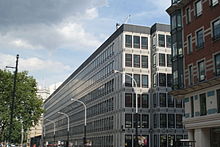
Summary
The Department of Trade and Industry (DTI) was a United Kingdom government department formed on 19 October 1970. It was replaced with the creation of the Department for Business, Enterprise and Regulatory Reform and the Department for Innovation, Universities and Skills on 28 June 2007.[1][2]
 | |
 | |
| Department overview | |
|---|---|
| Formed | 19 October 1970 |
| Preceding agencies | |
| Dissolved | 28 June 2007 |
| Superseding agencies | |
| Jurisdiction | United Kingdom |
| Headquarters | Victoria Street, London |
| Minister responsible |
|
| Website | The DTI website at the National Archives |
History edit
The department was formed on 19 October 1970[3] through the merger of the Board of Trade and the Ministry of Technology, creating a new cabinet post of Secretary of State for Trade and Industry. Additionally, the department also took over the Department of Employment's former responsibilities for monopolies and mergers. However, in January 1974, the department's responsibilities for energy production were transferred to a newly created Department of Energy. On 5 March that year, following a Labour Party victory in the February 1974 general election, the department was split into the Department of Trade, the Department of Industry and the Department of Prices and Consumer Protection.[4]
Reformation edit
In 1983 the departments of Trade and Industry were reunited. The Department of Energy was re-merged back into the DTI in 1992, but various media-related functions transferred to the Department of National Heritage. Until it was succeeded in June 2007 the DTI continued to set the energy policy of the United Kingdom.[5]
After the 2005 general election the DTI was renamed to the Department for Productivity, Energy and Industry,[6] but the name reverted to Department of Trade and Industry less than a week later,[7] after widespread derision, including some from the Confederation of British Industry.[8]
Later splits and mergers edit
In 2007, part of DTI merged into the new Department for Innovation, Universities and Skills (DIUS), while most of it was renamed as the Department for Business, Enterprise and Regulatory Reform (BERR); part of that would become the Department of Energy and Climate Change (DECC) in 2008. The responsibilities which had gone to DIUS largely returned in 2009 with a remerger to create the Department for Business, Innovation and Skills (BIS), though in 2016 the Department for International Trade (DIT) was split off. Energy returned in 2017 with the creation of the Department for Business, Energy and Industrial Strategy (BEIS); BEIS lasted until 2023 when this department was again split and mixed with other responsibilities, into the Department for Business and Trade (DBT), the Department for Energy Security and Net Zero (DESNZ) and the Department for Science, Innovation and Technology (DSIT).
Structure edit
The DTI had a wide range of responsibilities. There were ultimately nine main areas covered by the DTI:
- Company Law
- Trade
- Business Growth
- Innovation
- Employment Law
- Regional Economic Development
- Energy
- Science
- Consumer Law.
Emergent technology edit
From 1999 to 2005 it led the national E-Commerce Awards with InterForum, a not for profit membership organisation that helped British businesses to trade electronically. This aimed to encourage Small and Medium-Sized Enterprises to develop their business through the use of E-Commerce technologies.
Corporate policing edit
It also had responsibility for investigating misconduct by company directors, in which role Private Eye repeatedly lampooned it as "the Department of Timidity and Inaction".[9]
See also edit
- Avanti (project)
- Energy in the United Kingdom
- Restricted Enforcement Unit
- United Kingdom budget
- Business Link – set up by the DTI in 1993
- UK Trade & Investment – set up in 1999
- Special Representative for International Trade and Investment
References edit
- ^
"Department for business, enterprise and regulatory reform established" (Press release). Government News Network. 28 June 2007. Archived from the original on 14 December 2007. Retrieved 17 November 2016.
The Department for Business, Enterprise and Regulatory Reform (DBERR) will lead work to create the conditions for business success through competitive and flexible markets that create value for businesses, consumers and employees. It will work across Government and with the regions to raise levels of UK productivity, promoting the creation and growth of business.
- ^ "Department for Business, Energy & Industrial Strategy - GOV.UK". www.bis.gov.uk. Retrieved 23 March 2018.
- ^ "Records created or inherited by the Department of Trade and Industry". National Archives. National Archives. Retrieved December 22, 2012.
- ^ "Page Not Found - The National Archives". nationalarchives.gov.uk. Archived from the original on 12 March 2018. Retrieved 23 March 2018.
{{cite web}}: Cite uses generic title (help) - ^ "BERR history page". Archived from the original on 2008-12-04. Retrieved 2008-09-26.
- ^
Smale, Will (10 May 2005). "DTI falls to the rebranding sword". BBC News. Retrieved 17 November 2016.
To mark the start of Labour's third term in power, the DTI is no more, replaced by the Department for Productivity, Energy and Industry, or DPEI for short.
- ^
"Jibes prompt DTI rebrand U-turn". BBC News. 13 May 2005. Retrieved 17 November 2016.
New department head Alan Johnson persuaded Tony Blair to change the name back following derision from business leaders and unions.
- ^ DTI loses its dippy new title after one week, The Guardian
- ^ Norman Baker (19 May 2005). "Debate on Industry and the Environment - House of Commons". Hansard.
External links edit
- Department of Trade and Industry (Archive)
- DTI Website Archived on 6 June 2007
- Friends of the Action Group
- DTI e-commerce awards
Video clips edit
- Enterprise Initiative


